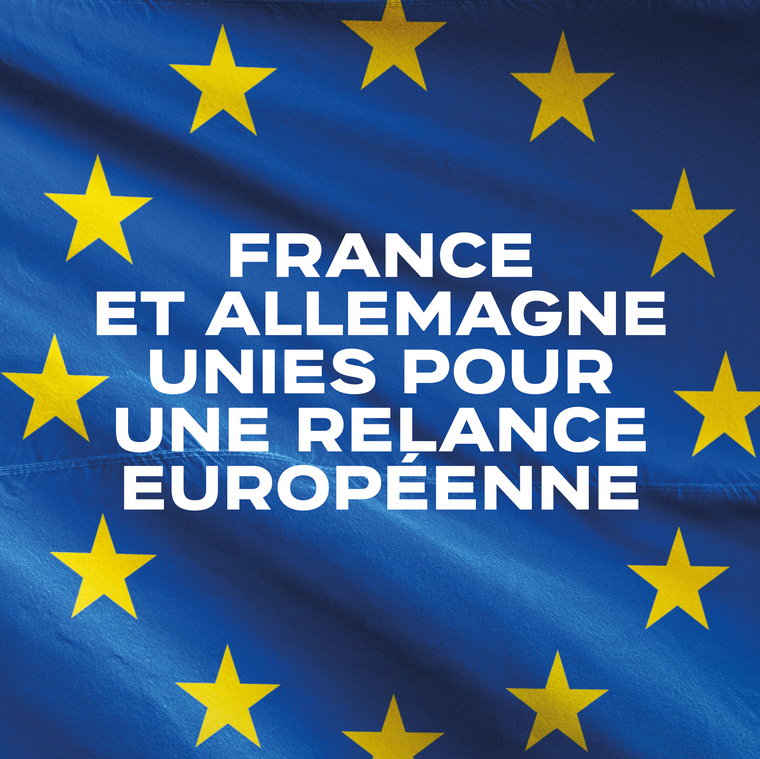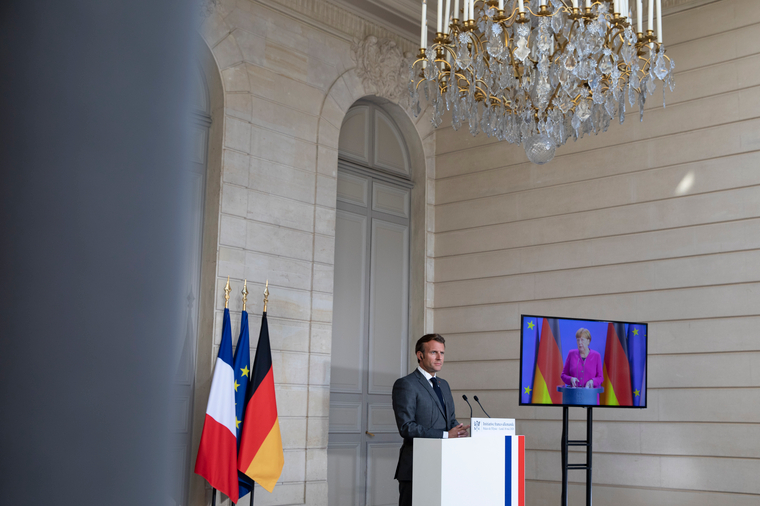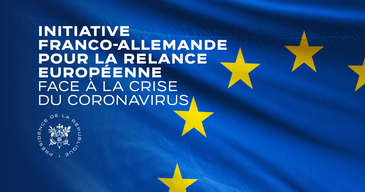
This is an unprecedented crisis in the history of the European Union. No way of life, no jobs, and no companies have been spared by this global shock. Although our societies and economies are reopening, much uncertainty remains. However, our goal is clear: Europe will overcome this crisis together and will emerge from it even stronger. Our joint efforts are guided by our will to achieve sustained recovery for the EU. In France and Germany, we are fully determined to shoulder our responsibilities towards the European Union and we will help open the way to moving on from the crisis.
To this end, we must now more than ever use the power of our joint European action to pool our resources like never before.
We must also engage in detailed discussions on what we must learn from this crisis. The Conference on the Future of Europe will be an opportunity to open a huge democratic debate on the European project, its reforms and its priorities.
France and Germany propose the following measures:
1. STRENGTHEN OUR STRATEGIC HEALTH SOVEREIGNTY VIA AN EU “HEALTH STRATEGY”
Our response to the current crisis and any future crises must be based on a new European strategic health sovereignty approach. We call for a strategically-placed European health industry which will improve the European dimension of health systems and reduce EU dependency while fully respecting the responsibility of Member States. We must therefore:
- Increase our research and development capabilities in the area of vaccines and treatments, as well as coordination and financing at international level (ACT-A initiative) with the short-term goal of developing and manufacturing a vaccine against coronavirus within the European Union, while guaranteeing global access to it;
- Put in place shared strategic stocks of pharmaceutical and medical products (protection equipment, testing kits, etc.) and develop production capabilities for these products in the European Union;
- Coordinate European policies as regards public procurement for vaccines and future treatments (e.g. manufacturing and stocking potential future vaccines) in order to reply as one to the pharmaceutical industry and ensure more effective European and global access;
- Set up an EU health task force within the European Centre for Disease Prevention and Control and task it, alongside national institutions, with drawing up prevention and response plans for future epidemics;
- Define shared European standards for the interoperability of health data (e.g. a harmonized methodology for producing comparable statistics on cases during epidemics).
2. CREATE AN AMBITIOUS “RECOVERY FUND” AT EU LEVEL FOR SOLIDARITY AND GROWTH
To support a sustainable recovery which restores and strengthens growth in the EU, Germany and France support the creation of an ambitious, temporary and targeted recovery fund as part of the next Multiannual Financial Framework (MFF) and an increase of the MFF in its initial years. Given the exceptional nature of the difficulties which the COVID-19 pandemic has placed on the economies of the entire EU, France and Germany propose authorizing the European Commission to finance this recovery solution by borrowing on the markets on behalf of the EU on a legal basis which fully respects the European Treaty, EU budget framework and the rights of national parliaments.
- The recovery fund will be provided with €500 billion in EU budgetary expenditure for the hardest-hit sectors and regions, based on EU budget programmes and in compliance with the European priorities. It will strengthen the resilience, convergence and competitiveness of European economies and will increase investment, including in ecological and digital transitions, research and innovation.
- The financing of the recovery fund will target difficulties linked to the pandemic and its repercussions. It will be an exceptional measure, included in the decision regarding our own resources, with a clearly specified volume and expiry date, and which will be linked to a binding repayment plan beyond the next MFF in the EU budget.
- A quick comprehensive agreement on the MFF and recovery fund is necessary to face the EU’s major challenges. The negotiations will be based on progress made up to February. We will try to make the budgetary efforts linked to the Coronavirus crisis as soon as possible.
- This support for the recovery complements national efforts and the series of measures set out by Eurogroup; it will be based on a clear commitment from Member States to apply sound economic policies and an ambitious reform programme.
- Improving the European framework to achieve fair taxation in the EU remains a priority, particularly by introducing minimum effective taxation and fair taxation in the digital economy within the EU, ideally drawing on the fruitful conclusions of the work of the OECD, and the creation of a common corporate tax base.
3. SPEED UP ECOLOGICAL AND DIGITAL TRANSITIONS
It is time to speed up the modernization of the economy and European economic models. In this spirit, we reaffirm that the Green Deal for Europe is the EU’s new growth strategy and our roadmap for a prosperous and resilient economy on the path to carbon neutrality by 2050. At the same time, we must speed up the digital transition by transforming the tendencies which emerged during the crisis into sustainable progress and digital sovereignty. To this end, we must:
- increase the EU’s objectives in terms of reducing emissions for 2030, in a coordinated manner with a series of effective measures to prevent “carbon leakage”. The proposal announced by the Commission for a Carbon Border Adjustment Mechanism will support existing instruments in line with WTO rules. The rules regarding State aids must be revised based on a more ambitious climate policy and risks of carbon leakage;
- support the introduction of minimum carbon pricing within the EU Emissions Trading System (EU ETS) and work to implement a future European ETS for all sectors;
- for each sector, draw up a roadmap for an environmentally-friendly recovery including, where necessary, climate and environmental targets and/or conditions;
- speed up digital transformation, particularly by deploying 5G in efforts to secure safe and reliable cybersecurity infrastructures and technologies, managing digital identities, a favourable environment for artificial intelligence and the fair regulation of EU digital platforms.
4. INCREASE THE EU’S ECONOMIC AND INDUSTRIAL RESILIENCE AND SOVEREIGNTY AND GIVE FRESH MOMENTUM TO THE SINGLE MARKET
Strong integration within the single market ensures our prosperity. Relaunching the European economy and adapting it to future challenges requires a resilient and sovereign economy and industrial base, and a strong single market. Open markets and free and fair trade are an essential part of the solution. We must therefore:
- Support the diversification of value chains by promoting an ambitious and balanced trade agenda, built around the WTO, with new initiatives, including in the area of the trade of healthcare products, strengthen our anti-subsidy instruments [from third countries], ensure that there is true reciprocity for procurement with third countries and step up investment control at national and European level for non-European investors in strategic sectors (including health, medicines, biotechnologies, etc.) while encouraging bringing investments (back) to the EU;
- Adapt the Commission’s industrial strategy to the recovery and in particular modernize European competition policy by speeding up adaptation of rules on state aid and competition, as well as by implementing major projects of common European interest [enabling European aid];
- Ensure a swift return to a fully functional single market and deepen it even further via a new roadmap to create a completely integrated market in priority areas (particularly digital technology, energy and financial markets) with clear benchmarks and a quicker legislative agenda;
- Ensure that the Schengen Area is fully functioning by improving obligations for coordination among Member States during crises and by strengthening shared external borders;
- Strengthen social convergence and speed up discussions on the EU framework for a minimum wage suited to national circumstances.

Watch the joint press conference with President Emmanuel Macron and Chancellor Angela Merkel:
18 May 2020 - Check against delivery
OPENING REMARKS BY THE PRESIDENT OF THE REPUBLIC, MR EMMANUEL MACRON, DURING THE JOINT PRESS CONFERENCE WITH THE CHANCELLOR OF THE FEDERAL REPUBLIC OF GERMANY, MS ANGELA MERKEL
Thank you very much, Madam Chancellor, my dear Angela Merkel.
Today, and in recent weeks, we have held numerous exchanges and discussions to deepen our common positions and forge this Franco-German agreement in the unprecedented context that Angela Merkel has just set out.
The current crisis is unprecedented and involves, requires, a response which must be collective and, first and foremost, European, if it is to be effective. Because, as we have both said since the beginning of this crisis, the virus knows no border and has affected all our Europe.
Europe, and we must be clear on this, no doubt fell short at the beginning of the crisis, firstly because public health is not a European competence – and the European Union should not be expected to address what is outside its purview.
Also because there were nationalist reflexes, particularly as regards border management, including within the Schengen Area. And in this respect we must learn all this pandemic’s lessons. Angela Merkel just reiterated that, and I totally agree with what she just said.
We also need to say that remarkable actions have been taken at European level. I do not want to forget the very tangible gestures of solidarity which have given Europe a human face. That solidarity has saved lives. Germany, Switzerland, Luxembourg and Austria took in almost 200 French patients. Both Germany and France have provided and delivered a lot of equipment to Italy and several other countries. And this solidarity is also part of the European spirit, and it is Europe that worked.
We have also had a very strong economic and monetary response since the crisis began. From mid-March, the European Central Bank made a massive suitable response and helped avoid a short-term financial crisis and greater interest rate spreads between European countries. The European Commission was very quick to lift the rules that could have constrained us fiscally or in terms of competition rules and enabled the Member States to make sectoral responses that were absolutely necessary.
This very important response also came with failings, egotism and delays, as I was saying. I have in mind the issue of borders. On this subject, nothing is taboo, and France, in coordination with Germany, actively pushed for a strict closure of the European Union’s external borders.
But within Europe, things were in our eyes different, not because of naivety but because of the need for effectiveness, as we needed to be equal to our history and not give in to demagogy. We put in place restrictions at all our borders, including with Germany, because it was necessary. We did so in coordination, and in constant liaison with Chancellor Merkel. We did not close the borders to all movement, and in particular, we allowed our 350,000 cross-border workers to continue working. We also allowed through certain food and health products that were essential for our countries. Other European countries simply did not have that reflex and closed all their borders without warning the neighbours, displaying a very sad image of our Europe.
Above and beyond that, essential debates remain to be had: that of financial solidarity in Europe, our European sovereignty, and a stronger Europe. That is the common belief the Chancellor and I are promoting, which has led us today to present this Franco-German initiative. It is the fruit of work that was bilateral, but carried out in liaison with several of our partners; we have carried out this work with Italy, Spain, Portugal, the Netherlands and several other countries, and with the President of the Council and the President of the Commission.
The Chancellor has set out the main thrusts of this initiative, so I will only come back to them briefly, focusing on coherence. Our initiative has four pillars: health, fiscal stimulus, the ecological transition and economic sovereignty. And I am convinced that this is the essential foundation for rebuilding our lives, our economies and our societies, which requires this strategy.
When it comes to health, what we want to do, together, is to give Europe a very tangible competence and to take action together, with common stocks of masks or tests, shared or coordinated purchasing and production capacities for treatments and vaccines, and shared prevention plans for epidemics with common methods to identify cases. That Health Europe has never existed. It needs to become our priority.
On fiscal matters and solidarity instruments, the Chancellor just briefly highlighted the importance of this recovery fund of €500 billion, which will supplement our financial horizons and therefore our European budget. But on the basis of existing treaties, what we are proposing together for the first time, Germany and France, to the 27 Member States, is firstly to decide together to take out common debt on the markets and to use this support of €500 billion, which will have to be repaid, as the Chancellor said, to provide funding earmarked as a priority for the sectors and regions hit hardest by the public health and economic crisis. And so to accept genuine transfers, a genuine common strategy to supplement our European budget. That is a major step forward and we hope the European Commission will further this proposal in the coming days and that all our partners will go along with it.
This recovery fund is €500 billion that will not be loans to this or that region or sector – it will go to real budget allocations drawing on our common debt, supplementing the agreement reached by our Finance Ministers for €500 billion under the Commission’s “SURE” reinsurance programme, as well as loans under the European Stability Mechanism and from the European Investment Bank. €500 billion in loans, with an agreement already reached by our Finance Ministers, and €500 billion of budget through the Franco-German recovery fund proposal. That is what we think is essential to top up the initiatives that have already been taken and will continue to be taken at national level.
The third lever we are promoting together is the acceleration of the ecological and digital transitions. Our message is simple: the European Green Deal, the green transformation of our economy, cannot be called into question. It needs to be speeded up. And sector by sector, the European recovery needs to come with commitments and conditions when it comes to the climate, the environment and biodiversity.
Lastly, the fourth thrust of our Franco-German agreement is that of genuine European sovereignty. We promote this belief together, that sovereignty means reducing our dependence on outside sources in strategic sectors like the production of medicines, as well as improving the protection of our businesses, better fighting predatory investments from other powers, and attracting and bringing back key investments to Europe. Europe must not close itself off from global trade. France even less so. Sometimes it must be less naive, it must better support the most strategic sectors and we believe we need to better share a common strategy of industrial and economic autonomy. In any case, that is what we are going to continue doing and strengthening together, France and Germany.
I will not go on any longer. We will now take questions.
Latest news
See all articles and topics-
18 December 2025 New UK-France Nuclear Steering Group met for the first time in Paris.

-
6 January 2026 Joint Statement on Greenland.

-
6 January 2026 Paris Declaration - Robust Security Guarantees for a Solid and Lasting Peace in Ukraine.

-
18 January 2026 Statement by Denmark, Finland, France, Germany, the Netherlands, Norway, Sweden and the United Kingdom.

